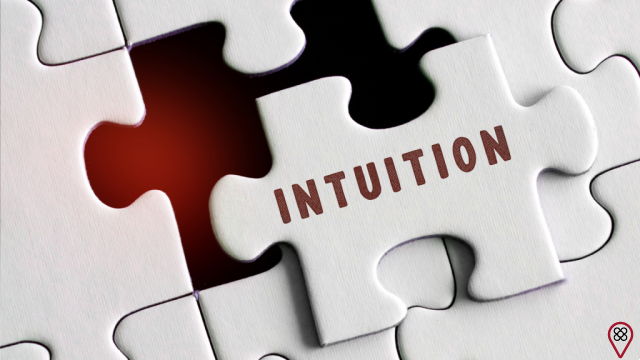Have you ever been sure of something, even though no one has told you anything about it? How can you not like a friend's boyfriend even though she has never complained about him to you, or even feel that something is going to go right or wrong before it even happens? Well, that's intuition speaking out loud.
However, not even science knows exactly how it works, even though it is a decisive element when making choices for many people. And because there is no explanation in the scientific community, there are those who believe that keen intuition is related to the paranormal or spirituality.
Understand more about intuition, what it is, how it works and other related topics in this article.
What is intuition?
In its etymological definition, the meaning of intuition is something like “to look inside”, “to see/contemplate within”.
According to psychology, intuition is a form of unconscious knowledge that makes us act faster. Because it is not a phenomenon of the conscious mind, it is still a mystery to science, but the most accepted hypothesis is that our brain records a lot of information from the past and allows us to access past failures and successes to help make faster decisions in the present. .

Target of study and curiosity of several famous people in the history of humanity, one of them was Carl Jung, a psychologist who already said: “Each of us has the wisdom and knowledge we need within ourselves.”
In some religious practices, intuition is considered a manifestation of the Divine in us, so it transcends reason. But, in general, spirituality (which is not just a religion or a religious practice) helps us to connect our inner world to the outside, and can connect us to a higher intelligence.
Where does intuition come from and how does it work?
As stated earlier, there is no consensus in science, but most lines of research are about memories of previous experiences and the fact that the human mind looks for patterns. So when you need to make a decision about money, for example, people who have gone through similar moments have more intuition about this type of decision than people facing some dilemma for the first time.
Who has been exposed to various situations, allows the brain to register more information and try to find patterns with the events of now to provide faster responses.
That's why at some point you've caught yourself thinking you were "reflection" act or decide such a thing, because you've been through some kind of similar situation (at least, to your brain) that made you sure about something even though you don't know why you're so sure.
Thus, even though the situation is unprecedented, the brain offers a range of prior knowledge and experience to help you make a decision. To trust or not is another story.
How important is intuition?
Providing automatic responses, intuition reduces the cognitive load and allows more accurate actions to events that we are already used to or to some pattern.

But is “thinking less” an advantage? Of course, it all depends on the case, but in most everyday choices, choosing automatically saves a lot of time. Imagine every day having to think about which clothes to wear and which not to wear. What to eat and what to avoid, which way to go and explain why not to go the other. Going to the bathroom now or in fifteen minutes?
Intuition shortens decision time and optimizes productivity. And, like instinct, it exists to keep us alive.
Is following intuition the opposite of being rational?
Common sense leads us to believe that following intuition is not being rational—and no one wants to be called irrational—which leads many people to ignore intuition and follow only analytical reasoning.
However one way of thinking does not cancel out the other., because they are not opposites, but two ways of thinking that can occur at the same time.
That's because intuition is the quick and automatic response of the subconscious, while analytical reasoning is slow, thoughtful and logical.
However, in unprecedented situations, in which a person has to make a decision literally from scratch, the brain brings both analyses. In fact, the human brain is capable of carrying both streams of thought at all times, but the intuition side dominates so he doesn't have to give two options and taking time to make decisions at all times.
With the idea that we should be rational and analytical people, a discourse that came with science, which in this case, yes, needs to have an analytical discourse, not based on inexplicable impressions and guesses, intuition started to be devalued. In everyday life, however, using intuition is using shortcuts and saving time.
The female intuition
Intuition is not just a feminine characteristic, but present in all people, but we commonly hear about the feminine “sixth sense”. Could this have something to do with intuition?
A survey conducted in the UK found that women say they have keener intuition, but in a test to detect fake smiles, they were worse than men. However, the research was carried out online and through photos, which does not reveal much about intuition.

Other lines of research reveal that yes, women have better intuition, hence the sixth sense. In this second line of research, scientists found that women have more nerve impulses in the channel that connects the two hemispheres of the brain (called the corpus callosum), which causes them to register and retrieve more information. Thus, the more information recorded, the faster and less susceptible to error is the response.
In addition, women have interpersonal intelligence at levels above men, so they are able to multi-task, which allows “automatic mode” to take over some activities, so faster responses are given.
How to listen to my intuition?
If you are one of those people who devalued intuition because you thought being rational 100% of the time was the best choice and tried to cancel the voice of intuition, know that there is no total loss of intuition due to lack of use.
What happens is that sometimes we get used to not believing in intuition. This is for a variety of reasons, from past failures of intuition, lack of confidence in ourselves, or fear of failure. People with low self-esteem also tend to disbelieve in themselves, in their feelings and in their intuition, for devaluing everything that is theirs. So the best way to develop a better intuition is to work with self-esteem, developing it and gaining self-confidence. Especially because, as already mentioned, people with more life experience have better intuition — and people with low self-esteem avoid experiencing different experiences. That is, it is a fact that intuition is linked to optimism and confidence.
Furthermore, even if intuition has failed in the past, it is necessary to overcome what happened. Never trusting intuition again because of a mistake in the past damages not only intuition but self-esteem, leading to many other problems.
Exercise your intuition in everyday choices that do not bring risks and harm if the choice is not the right one. Experiencing is having the baggage to choose better in the future.
So, when you have to make a difficult choice, one that requires a lot of time to think, reflect. You don't have to literally close your eyes and do what your heart tells you, but listen to what he has to say and compare it to your rational side. Although sometimes you don't choose intuition, listening to it is always valid because it is important to give voice to your own impressions, no matter how “silly” they may seem.
You may also like
- Learn why you should always take your intuition into account
- Have you heard about the documentary “InnSaei – The Power of Intuition”? Meet now!
- Learn 5 advantages of working on your intuition
Finally, even though it is a mystery to science, intuition is present in our subconscious. It helps us to save time and provide quick, reflexive responses. For spirituality, it is the communication between us and the divine. For psychology, knowledge and impressions recorded without consciousness. Anyway, she came to help us.
In more common situations, intuition doesn't usually fail because it brings together similar situations from the past and brings up an answer that already worked, but in new situations, intuition can fail. However, listening to intuition is not canceling analytical thinking—and vice versa.
Therefore, as much as the rational side weighs in unprecedented situations, it is important to understand what your intuition has to say and know how to separate fears and desires from what intuition really is.
Knowing how to choose what is best for you is always the best option. Regardless of being the “voice of reason” or the “voice of the heart”, the important thing is to do what must be done in the best possible way and with confidence, always respecting your purposes and feelings.

























